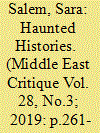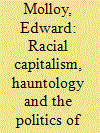| Srl | Item |
| 1 |
ID:
167657


|
|
|
|
|
| Summary/Abstract |
This article revisits the Nasserist project through the lens of haunting. It explores the afterlives of Nasserism, in particular in relation to Egypt’s move toward a free market economy from the 1970s onwards. To do this, I explore the Nasserist project in order to excavate some of the promises that were made and to trace the legacies these created. I argue that both these promises—only partially fulfilled—and the social violence they at times contained—continued to act as powerful political memories that limited Egyptian politics in the decades that followed. Thinking of Nasserism as a form of haunting allows for a deeper understanding of how different political projects seep into one another, problematizing the notion of a linear teleological or providential trajectory consisting of distinct eras. In distinction to work that has mobilized the concept of haunting (originally theorized by Jacques Derrida) in order to elaborate on the historical manifestation of damaging or violent legacies in the present, I argue that Nasserist forms of haunting should be read as both a productive and destructive normative force in the present. This article puts forward examples of both, particularly in relation to questions of social justice, socialism, and anti-imperialism.
|
|
|
|
|
|
|
|
|
|
|
|
|
|
|
|
| 2 |
ID:
177966


|
|
|
|
|
| Summary/Abstract |
This article explores the ways in which death can be understood to occupy a formative function in the construction of Irish national identity. The analysis of three distinct moments in Irish history (Plantation-era funerary practices, the Great Famine, and the 1981 hunger strikes) is undertaken with recourse to Michel Foucault’s understanding of race as it is deployed through disciplinary and biopower and Achille Mbembe’s concept of necropolitics. The continuing concern with history in Irish political discourse is juxtaposed with Derrida’s idea of ‘hauntology’. It will be seen that the act of remembering politically carries with it an ambivalent legacy, exposing the violence at the heart of the establishment of both states in Ireland, while maintaining the potential of emancipatory promise. This promise is itself rooted in the violence implicated in the production of alterity through the historical experience of death.
|
|
|
|
|
|
|
|
|
|
|
|
|
|
|
|
| 3 |
ID:
164025


|
|
|
|
|
| Summary/Abstract |
Spirits hold a central but ambivalent position in Indonesian political and social life. Pushed to the margins of public discourse in recent decades by modernism and Muslim piety, spirits remain key to the realm of the invisible or inscrutable (gaib) and continue to have a strong hold on the popular imagination in communities and on TV screens across the archipelago. One kind of spirit combines imagined potential and public ambivalence with particular force: jin spirits (also spelt jinn). Described in the Koran as real spiritual entities with an unfortunate habit of possessing humans, jin spirits are today also associated with heretical forms of Islam for many people with pious Muslim sensibilities and with backward superstition and evil magic for those with modern, secular sensibilities. Dealing with jin spirits, as a result, is always a careful negotiation with these cross-cutting sensibilities. This paper follows Kyai Muzakkin, the leader of an Islamic boarding school or pesantren in East Java, who insists that the one thousand jin spirits at his pesantren are real and effective “tools” at his disposal. I suggest that Kyai Muzakkin’s insistence on spirits as “tools” responds to the repressed and ambivalent reality of spirits in Indonesia. By turning tech-gnosis, the modern fascination with technology, into both ontological proof of and moral justification for the existence of spirits, Kyai Muzakkin harnesses the magic of modern technology – and of tele-technology in particular – in support of the reality of the invisible realm. While tele-technology thereby vindicates the reality of spirits and advocates for alternative ways of seeing Islam and the modern nation of Indonesia, I also argue that this vindication comes at a cost; namely the ambivalent re-inscription of visibility as proof of the real.
|
|
|
|
|
|
|
|
|
|
|
|
|
|
|
|